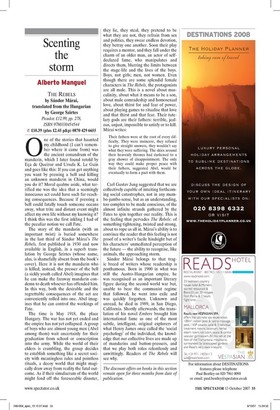Scenting the storm
Alberto Manguel THE REBELS by Sandor Marai, translated from the Hungarian by George Szirtes Picador, £12.99, pp. 278, ISBN 9780330454544 £1039 (plus £2.45 p&p) 0870 429 6655 ne of the stories that haunted my childhood (I can't remember where it came from) was the ancient conundrum of the mandarin, which I later found retold by Eca de Queiroz and Ursula K. Le Guin and goes like this: If you can get anything you want by pressing a bell and killing an unknown mandarin in China, would you do it? Moral qualms aside, what terrified me was the idea that a seemingly innocuous act could have such far-reaching consequences. Because if pressing a bell could fatally touch someone oceans away, what trite and distant event might affect my own life without my knowing it? I think this was the first inkling I had of the peculiar notion we call Fate.
The story of the mandarin (with an important twist) is buried somewhere in the last third of Sandor Marai's The Rebels, first published in 1930 and now available in English, in a superb translation by George Szirtes (whose name, alas, is shamefully absent from the book's cover). Here it is not the mandarin who is killed; instead, the presser of the bell (a sickly youth called Abel) imagines that he can make the faraway mandarin condemn to death whoever has offended him. In this way, both the desirable and the regrettable consequences of the act are conveniently rolled into one. Abel imagines that he can control the workings of Fate.
The time is May 1918, the place Hungary. The war has not yet ended and the empire has not yet collapsed. A group of boys who are almost young men (Abel among them) wait uncertainly for their graduation from school or conscription into the army. While the world of their elders is crumbling, the group decides to establish something like a secret society with meaningless rules and pointless rituals, a decoy world that might magi cally draw away from reality the fatal outcome. As if their simulacrum of the world might fend off the foreseeable disaster, they lie, they steal, they pretend to be what they are not, they refrain from sex and politics, they swear endless devotion, they betray one another. Soon their play requires a mentor, and they fall under the charm of an older man, an actor of selfdeclared fame, who manipulates and directs them, blurring the limits between the stage-life and the lives of the boys. Boys, not girls; men, not women. Even though there are some splendid female characters in The Rebels, the protagonists are all male. This is a novel about masculinity, about what it means to be a son, about male comradeship and homosexual love, about thirst for and fear of power, about playing games to ritualise that love and that thirst and that fear. Their tutelary gods are their fathers: terrible, jealous, unjust, impossible to satisfy or to kill. Marai writes: Their fathers were at the root of every difficulty. They were insincere, they refused to give straight answers, they wouldn't say what they were suffering. The skies around their heavenly thrones had darkened to a gray shower of disappointment. The only way they could make proper peace with their fathers, suggested Abel, would be eventually to form a pact with them.
Carl Gustav Jung suggested that we are collectively capable of intuiting forthcoming social catastrophes, not in any mumbo-jumbo sense, but as an understanding, too complex to be made conscious, of the almost infinite strands gathered by the Fates to spin together our reality. This is the feeling that pervades The Rebels: of something tightening, twisted and strong, about to rope us all in. Marai's ability is to convince the reader that this feeling is not proof of a writer's facile hindsight but of his characters' unmediated perception of the future — the ability to recognise, like animals, the approaching storm.
Sandor Marai belongs to that tragic breed of writers whose readership is posthumous. Born in 1900 in what was still the Austro-Hungarian empire, he was recognised as an important literary figure during the second world war but, unable to bear the communist regime that followed, he went into exile and was quickly forgotten. Unknown and unread, he died in 1989, in San Diego, California. Shortly afterwards, the translation of his novel Embers brought him international fame as one of the most subtle, intelligent, original explorers of what Henry James once called the 'social psychology' of the individual, the knowledge that our collective lives are made up of mandarins and button-pressers, and that we play both roles relentlessly and unwittingly. Readers of The Rebels will see why.
The discount offers on books in this section remain open for three months from date of publication.



































































 Previous page
Previous page